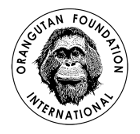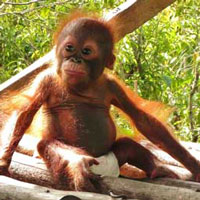It only takes one moment of clarity to realize how important enrichment is for captive animals. My moment of clarity came last week when I was introduced to a young orangutan through long-term volunteer Jennifer Donay. Not only has this orangutan inspired a unique new enrichment program, but she also has taught me many lessons… Continue reading Enrichment: Week V
Month: August 2010
Orangutan of the Month: George Baru
George Baru* is an amazing little guy. He has big expressive brown eyes that take in the world around him and a charismatic little personality that draws people to him. If he had a bit more courage, his curiosity would, no doubt, get him into a lot of mischief. But George is only nine months… Continue reading Orangutan of the Month: George Baru

